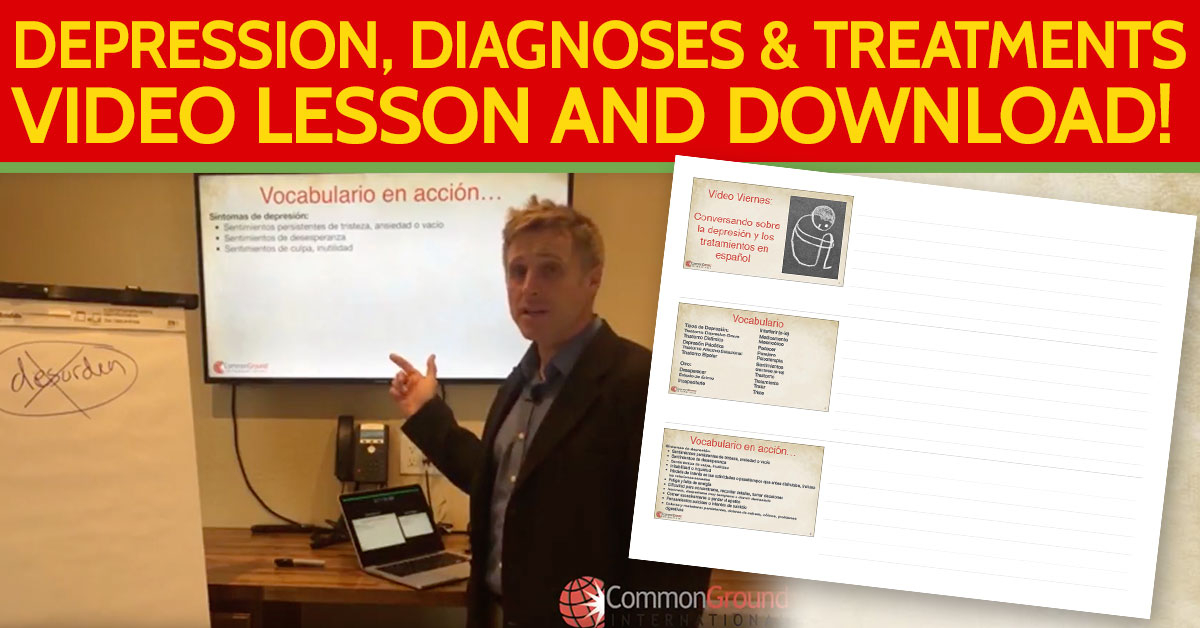This Medical Spanish lesson teaches you how to evaluate depression in Spanish using SIG E CAPS and PHQ-9 with your Spanish speaking patients.
Subscribe to our YouTube Channel to see all of our lessons and get the latest videos right away!
Note: I published a lesson about SIG E CAPS early this year. You can check it out here.
Vocabulario: Emoción/Estado
| Aburrido/a | Bored |
| Agitado/a | Agitated |
| Agotado/a | Exhausted |
| Ansioso/a | Anxious |
| Así, así | So so |
| Bien | Good, fine |
| Cansado/a | Tired |
| Confundido/a | Confused |
| Contento/a | Happy |
| Deprimido/a | Depressed |
| Despierto/a | Awake |
| Dormido/a | Asleep |
| Enfermo/a | Sick, hill |
| Enojado/a | Angry |
| Feliz | Happy |
| Frustrado/a | Frustrated |
| Igual | The same |
| Inquieto/a | Restless |
| Mal | Ill / Not Well |
| Más o menos | So so |
| Mejor | Better |
| Muy bien | Very good |
PHQ-9:
¿Se ha sentido decaído(a), deprimido(a), o sin esperanzas?
Have you felt down, depressed, or hopeless?
Vocabulario Útil…
Verbos útiles con emociones:
| Estar: | To be: |
| ¿Está _____? | Are you _____? |
| ¿Ha estado _____? | Have you been ______? |
| Sentirse (e-ie): | To feel: |
| ¿Se siente _____? | Do you feel ______? |
| ¿Se ha sentido _____? | Have you felt ________? |
| Tener (e-ie): | To have: |
| ¿Tiene _____? | Do you have _______? |
| ¿Ha tenido _____? | Have you had _______? |
Duración/Frecuencia de tiempo
SIG E CAPS
- S: Sleep – Sueño
- I: Interest – Interés
- G: Guilt – Culpa
- E: Energy – Energía
- C: Concentration – Concentración
- A: Appetite – Apetito
- P: Psychomotor – Psicomotor
- S: Suicide – Suicidio
Sleep – Sueño
PHQ-9:
¿Ha tenido dificultad para quedarse o permanecer dormido(a)? ¿O ha dormido demasiado?
Have you had difficulty staying asleep? Or have you slept too much?
Interest – Interés
PHQ-9:
¿Ha tenido poco interés o placer en hacer cosas?
Have you had little interest or pleasure in doing things?
Guilt – Culpa
| ¿Lamenta o se arrepiente de algo? | Do you regret something? |
| ¿Se siente responsable o culpable por eso? | Do you feel responsible or guilty because of that? |
PHQ-9:
- ¿Se ha sentido mal con usted mismo(a)? – Have you felt bad about yourself?
- ¿O que es un fracaso? – Or that you are a failure?
- ¿O que ha quedado mal con usted mismo(a) o con su familia? – Or have you offended or done wrong by yourself or your family?
Energy – Energía
PHQ-9:
¿Se ha sentido cansado o con poca energía?
Have you felt tired or with little energy?
Concentration – Concentración
PHQ-9:
¿Ha tenido dificultad para concentrarse en ciertas actividades, tales como leer el periódico o ver la televisión?
Have you had difficulty concentrating on certain activities, such as reading the newspaper or watching television?
Appetite – Apetito
PHQ-9:
¿Ha estado sin apetito o ha comido en exceso?
Have you been without appetite or have you eaten excesively?
Psychomotor – Psicomotor
PHQ-9:
- ¿Se ha movido o hablado tan lento que otras personas podrían haberlo notado? – Have you moved or talked so slowly that other people might have noticed?
- ¿O, lo contrario – ha estado muy inquieto(a) o agitado (a) que ha estado moviéndose mucho más de lo normal? – Or, the opposite – have you been very restless or agitated that you have been moving much more than usual?
Suicide – Suicidio
PHQ-9:
¿Ha tenido pensamientos de que estaría mejor muerto(a) o de lastimarse de alguna manera?
Have you ever had thoughts that you would be better off dead or hurting yourself in some way?
Situational Notes
Cosas que causan estrés:
| Muerte | Death |
| Divorcio | Divorce |
| Demasiadas responsabilidades | Too much responsabilities |
| Mudarse | To move |
| Enfermedades graves | Serious diseases |
| Pérdida de empleo o problemas en el trabajo | Loss of employment or problems at work |
| Problemas con las finanzas | Problems with finances |
| Problemas con otros miembros de la familia | Problems with other family members |
Las realidades para inmigrantes:
| Inestabilidad en el trabajo | Instability at work |
| Múltiples trabajos | Multiple jobs |
| Inestabilidad del hogar | Instability at home |
| Separación de familiares | Separation of relatives |
| Traumas durante inmigración | Trauma during immigration |
| Ingresos bajos | Low incomes |
| Dificultades sistémicas en buscar atención médica | Systemic difficulties in seeking medical attention |
Cultural Notes
Estadísticas de depresión en Latinos:
| Los latinos mayores de 18 años son menos propensos a reportar depresión | Latinos over 18 are less likely to report depression |
| Los adolescentes latinos tienen mayor riesgo de suicidio: 18.9% lo piensan, 11.3% lo intentan | Latino teenagers have a higher risk of suicide: 18.9% think about it, 11.3% try it |
| Pocos buscan ayuda profesional: | Few seek professional help: |
| Menos de 1/11 contactan especialistas en salud mental | Less than 1/11 contact mental health specialists |
| Menos de 1/5 tienen un proveedor de atención primaria | Less than 1/5 have a primary care provider |
| Menos de 55% de adultos (y 30% de adolescentes) con episodios depresivos reciben tratamiento | Less than 55% of adults (and 30% of adolescents) with depressive episodes receive treatment |
Source: Hufft Post
Now it’s your turn! I packaged all of this vocabulary in Spanish into some flashcards for you to study.
I packaged all of this into easily downloadable .pdf notes– Get your copy for free today!
Keep up the good work speaking responsible Spanish to your patients! Check out our other books, classes & products to help you !
*If the link isn’t working for you, you may need to unblock pop-ups in your browser settings
Other posts in this Mental Health series:
Questions and Phrases to Assess Child Abuse and Neglect in Spanish
This Medical Spanish lesson focuses on learning how assess child abuse and neglect in Spanish….
Mental health Conversation in Spanish – Listening Comprehension
Work on your listening comprehension in Spanish and learn about the mental health situation in…
How to Teach Coping Strategies in Spanish
Coping strategies in Spanish are “Estrategias de afrontamiento”. This week, as I was preparing to…
PHQ 9 and GAD 7 for depression and anxiety screenings in Spanish
Screening for depression and anxiety with the PHQ-9 and GAD-7 in Spanish. Do you ever…
Discussing ADD and ADHD in Spanish
ADD in Spanish is “TDA: el trastorno de déficit de atención” and ADHD is “TDAH:…
Discussing PTSD in Spanish
PTSD in Spanish PTSD is lesson 4 in our 5-lesson series on discussing mental health…
Discussing Substance Abuse in Spanish
In today’s lesson, we’re addressing topic #3 from the mental health survey that our community…
Discussing Anxiety in Spanish
This is Lesson 2 of 5 in our Mental Health in Spanish series. In this…
Discussing Depression in Spanish
This is Lesson 1 of 5 in our Mental Health in Spanish series. In this…
Mental Health Conversations in Spanish
In this free Medical Spanish lesson you will learn how to have Mental Health Conversations…
Explaining Depression Diagnoses & Treatments in Spanish
This Medical Spanish lesson focuses on explaining the depression diagnoses and treatments in Spanish to…















